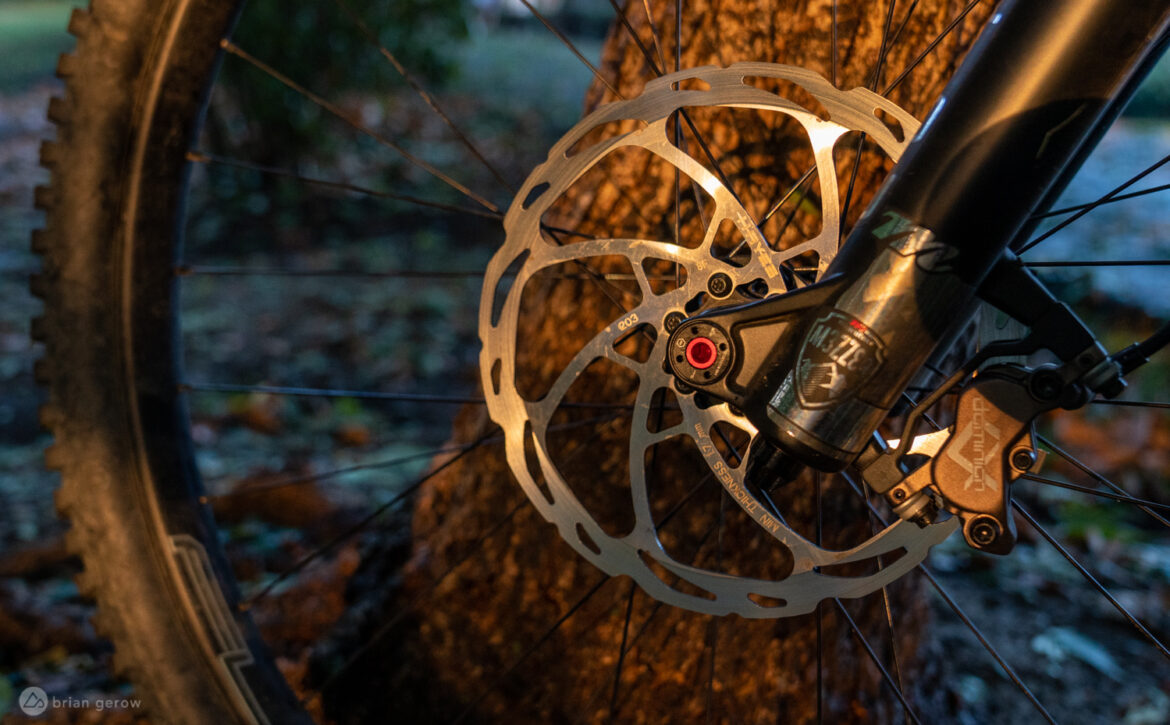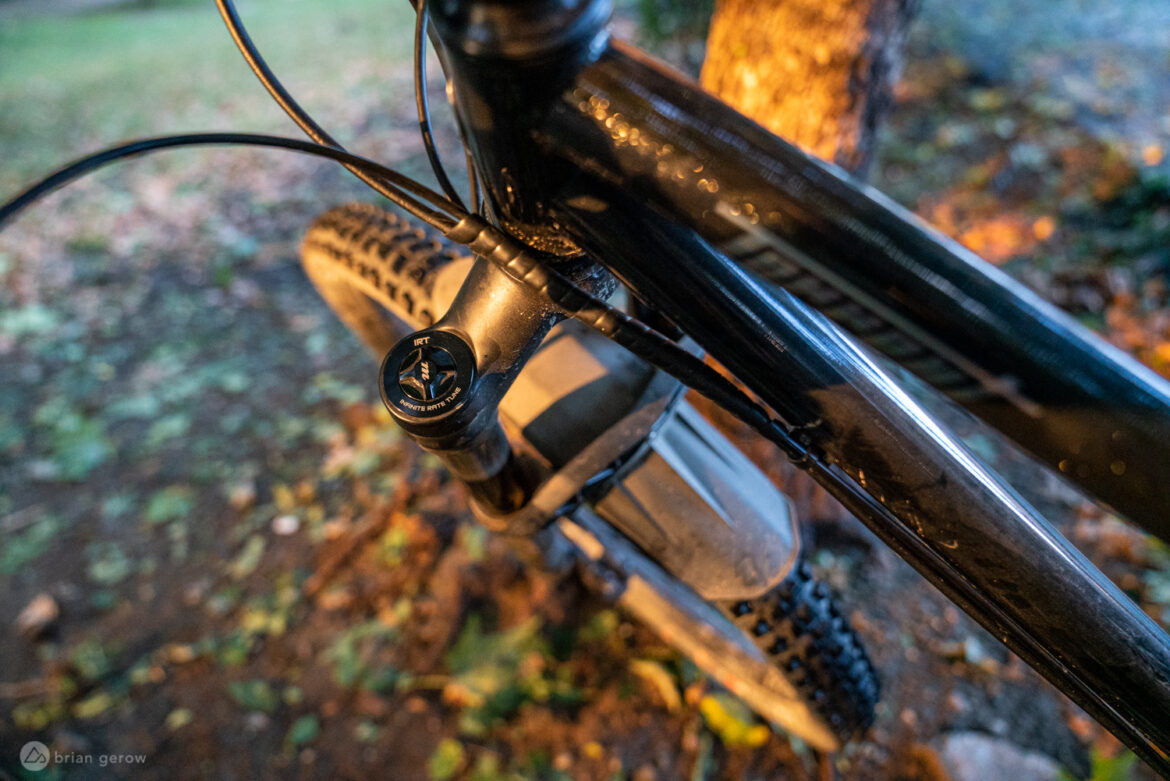There are a few avenues suspension designers can follow to make a mountain bike fork unique. They can focus on the oil, seals, and stanchion precision to reduce friction and stiction. They might also add heft or a unique shape to the chassis to give the body rigidity in one or many directions. They can tack on cool features like bolt-on fenders, unique through-axle bolts, additional external adjustments, or a reversed crown. Then, on the inside, they typically hide a cluster of unique gadgets with cool names and cooler functionality.
Manitou took nearly all of these steps to separate their long travel Mezzer Pro fork form the herd, and almost all of them returned positive benefits. The fork comes with space for 27.5″ or 29″ tires with 37, 44, or 51mm offsets. For $999.99 buyers can adjust the travel between between 140 and 180mm in 10mm increments by swapping in a set of spacers.
With three air chambers, and all of the other external adjustments we’ve come to expect, this fork can be dialed to satisfy even the most finicky suspension tinkerer’s desires. I recently ran the Mezzer Pro through a few thousand cycles on a sturdy steel hardtail. The full details and ride impressions follow.
The chasis

When Manitou released the Mezzer Pro in May of 2019 it was the first single crown fork with 37mm stanchions. While I have yet to test the new Fox 38 or RockShox Zeb with their mini-DH 38mm upper tubes, I can say that the Mezzer provides an excess of stiffness for a 150lb. rider like myself. The fork is so stiff that I ended up swapping out a 35mm Pro Taper handlebar for their 31.8mm clamp version to add a little flex up front. Paired with a carbon front rim, the amount of line-holding precision that this fork provides feels profound. Provided your tires have adequate grip, this fork can take you where you point it. Manitou claims that the Mezzer is the stiffest and lightest fork on the market, and at roughly 2,000 grams (29″ 150mm tested) I’d say they’ve nailed that balance. For comparison’s sake, that’s roughly 200 grams lighter than a similarly sized Fox 38.
The reversed arch in the middle of this fork not only looks cool, but it also deflects some of the tire’s trail gifts. The fitted fender that comes with the fork is relatively flimsy. It slaps against the tire regularly, and I have been expecting it to get caught by the tire and tear free from the fork at some point. Instead it has held strong, flapping flexy and keeping the mud off my goggles. Bolt-on fenders are one of the many things I wish the industry would standardize so that we could all save our zip ties and eyes at the same time. Unfortunately, the set back angle of the reverse arch makes this floppy stock fender the best option.

The through-axle also functions somewhat uniquely on this fork. There must be patent-related reasons why all forks can’t just use a simple bolt-style axle, because every brand uses a different method — and none of them are better than a bolt that’s turned by a hex key. The Manitou through-axle solution, called Hexlock, uses a bolt that is held stationary when slid through the driveside dropout and tightened by a nut that remains in the non-driveside dropout. While this system works well, it adds moving parts to the axle that will eventually wear out. Again, an axle that mimics a classic bolt would do just fine.
Riders can either run their front brake hose around and behind the fork, or crossing between the non-driveside lower and the wheel like usual. I opted for the traditional route, but If my levers were mounted moto-style I might check out the “around the back” routing.
The MC2 damper

The Mezzer uses a fully sealed cartridge MC2 Damper that is similar to those in other high end performance forks. Manitou says that the cartridge “utilizes a bladder with a blow off valve to prevent rupture under high pressures and keep your damping controlled and consistent no matter the terrain.” The damper includes a hydraulic bottom out to avoid jarring impacts from reaching the rider when the landing is extra sharp.
High-speed and low-speed compression sit above a lonely low-speed rebound knob, and all of the clickers have a useable range that allows for fine tuning to match different terrain. I ended up adding a fair bit of compression to achieve the amount of midstroke support I wanted without adding air pressure that would have reduced the fork’s traction grabbing properties. There is a tuning guide on the Manitou website that divides damper tunes by riding style: trail, enduro, downhill. Since I tested the fork on an all-mountain hardtail, where I favor weighting the front wheel more than I would with a full-suspension bike, I ended up in their “downhill” range. With the high-speed compression closed halfway, and the low-speed only a little further open, the Mezzer felt every bit as supportive and responsive as the competition.
| Price | $999.99 (available online at JensonUSA and Wiggle) |
| Weight | Roughly 2000g, 29″ 150mm |
| Travel | 140-180mm internally adjustable |
| Wheel sizes | 27.5″ or 29″ |
| Offset | 29″ available in 44 and 51mm, 27.5″ in 37 and 44mm |
| Stanchion diameter | 37mm |
| Brake mount | Direct mount 180, Max 203mm |
That Dorado air spring

In contrast to the larger stanchions and reversed arch, the Durado air spring in this fork is a unique and innovative element that you can’t see. To balance the positive and negative chambers, Manitou uses “a closing poppet valve within the air piston. Thus there is no port or dimple in the lowers that equalizes the pressure. Instead, both chambers will fill simultaneously when attaching the shock pump at the main valve. [Then], both the positive and negative chamber will open and close simultaneously.” Unlike the competition, the Mezzer Pro has a third air chamber at the top that acts as a volume reducer. Instead of opening the fork to add or remove spacers to shift its progressivity and bottom out support, you can infinitely adjust that support one stroke of the shock pump at a time. This additional chamber in the Durado air spring is appropriately named the IRT, or Infinite Rate Tune.
Once the sag is set, you can add air to the IRT to better match your riding style and trails. On long days in a flowy bike park you might want the fork to ramp up a touch earlier in its travel compared to where’s it’s set for your usual lunch lap, to save you any messy landings. For an enduro race you could pump the IRT up an additional 5 PSI to add midstroke support and keep the front end high on steeper natural trails.
In short, this fork is not only surprisingly light and wicked stiff, it’s also at the top of the suspension tuneability chart.
On the trail

The Mezzer Pro took some time to tune. I started off with the recommended “enduro” settings since that’s the sort of racing I had originally built this little hardtail up for. I then messed around with the air settings far too much, and finally realized that I needed to leave the main chambers where they were, with reasonable sag and a fluid initial stroke, and move to the IRT to dial in the support. I reset the static sag with the main chamber valve and added air in the IRT until it felt well supported and safe from bottom outs. Between the hydraulic bottom out and IRT progression, I have yet to bottom out the Mezzer, despite some unplanned hucks and intentional drop-to-flat tests from a shoulder-high stone.
This Norco Torrent hardtail has proven a fantastic fork testing platform, as the steel frame holds a stiffer stance than similar bikes I have tested, making a properly tuned fork paramount. I have ridden loads of lunch laps on my local descents and taken the bike to Finale Ligure to test the fork on longer and rougher trails, and I’ve been repeatedly impressed with its performance on a wide variety of trails.
At home I’m able push suspension harder, knowing what’s around every tiny bend in the trail. One of the more exciting aspects of taking this fork up to full speed is that you can run the rebound fairly fast to give the bike a lively feel without sacrificing much front tire traction. The initial stroke remains silky and doesn’t kick back so fast that it washes the tire. On a hardtail that faster rebound results in a more fun ride, opening up options for things to pop off or over.
I know the trails in Finale Ligure well, but a massive storm last fall destroyed all of them, and the rebuild process has created some new lines, ruts, and reroutes that make them all feel new. I was able to ride most of the “flowy” tracks at a speed similar to that of my full suspension bike, and as long as I kept my elbows bent and weight forward the Mezzer kept the front end high and as smooth as I could expect from 150mm of squish mounted on a heavy hardtail.

The fork is one of the few effective ways to adjust the ride quality with this bike, and the Mezzer does a fantastic job. Both at home and by the sea I was able to click in a little more high-speed compression when I knew the trail would be extra messy, and back it off for the singletracks I remember like the cracks in my palms. With a travel range between 140 and 180mm, I would happily mount this fork on any bike I own.
As I mentioned above, the chassis stiffness of the Mezzer Pro is greater than that of other forks I’ve ridden. I did notice a little fore/aft flex under heavy braking at one point, but after checking for the same with all of my other forks I found it was well within the range of normal. I believe I noticed it with the Mezzer because the reversed arch makes the front end look different from the rider’s perspective, inviting me to pay more attention to it than I normally would. This fork will likely hold ample rigidity for riders far heavier and harder hitting than I am.
Conclusion
Without a lab to test stiffness, we can’t quite analyze Manitou’s claims of “stiffest enduro fork on the market” but once the dials were clicked to the right spot the Mezzer Pro proved its place among the best. With a competitive price, and class leading weight and adjustability characteristics, this fork is worth close consideration for all-mountain and enduro riders who are in the market for an upgrade.
Thanks to Manitou for providing the Mezzer Pro for testing.
⭐️ Find the Manitou Mezzer Pro mountain bike fork online at JensonUSA and Wiggle.




















